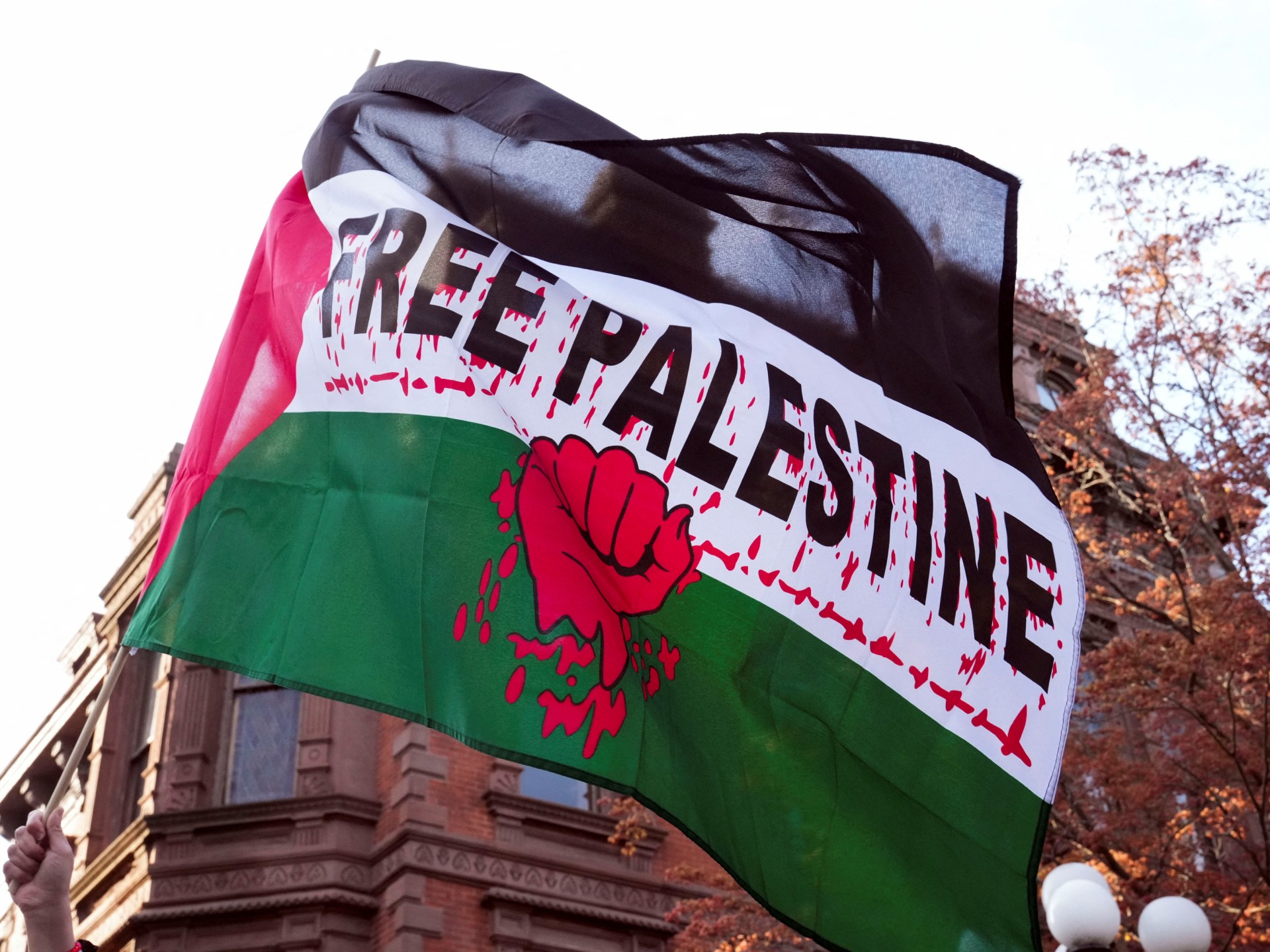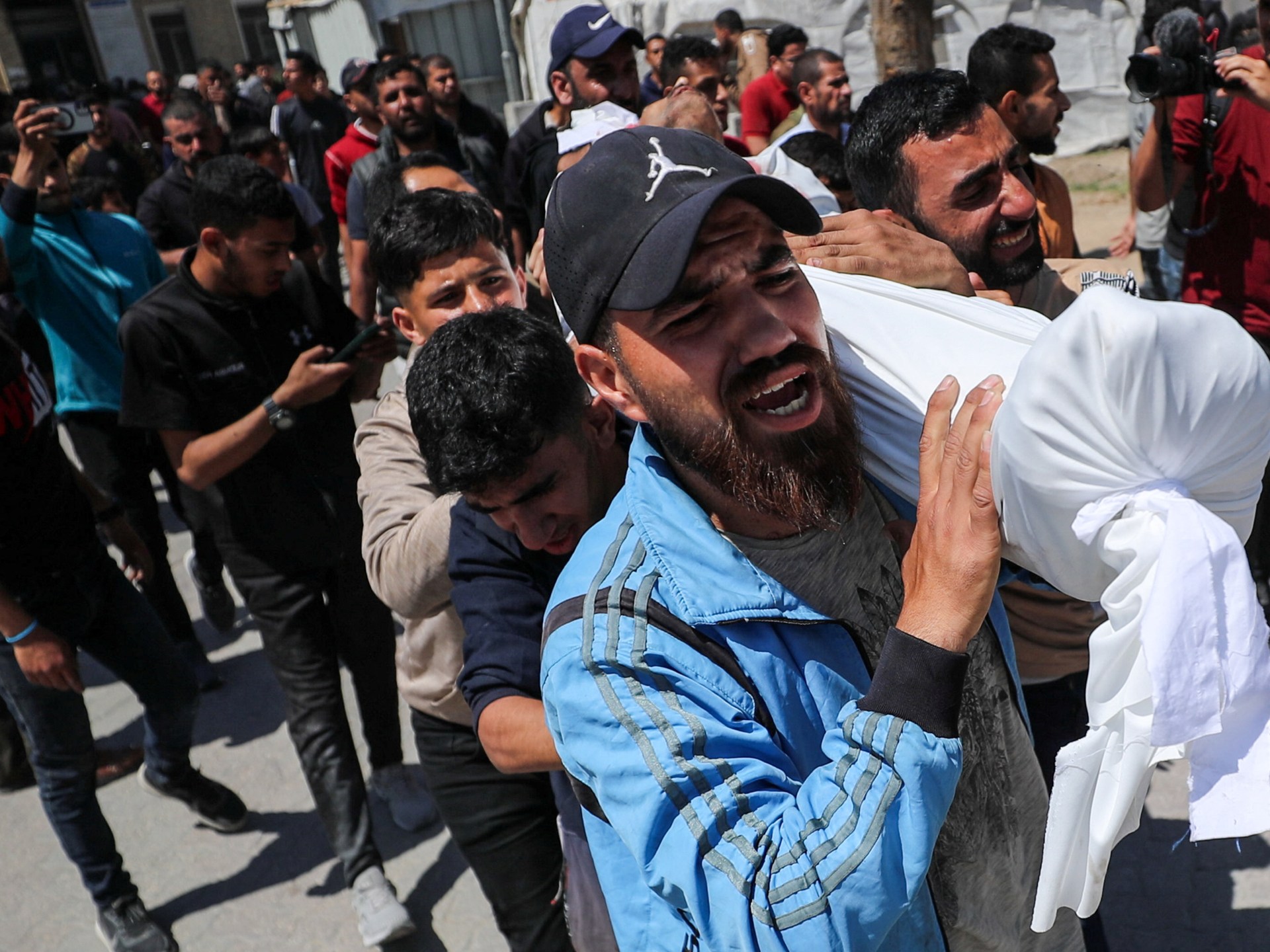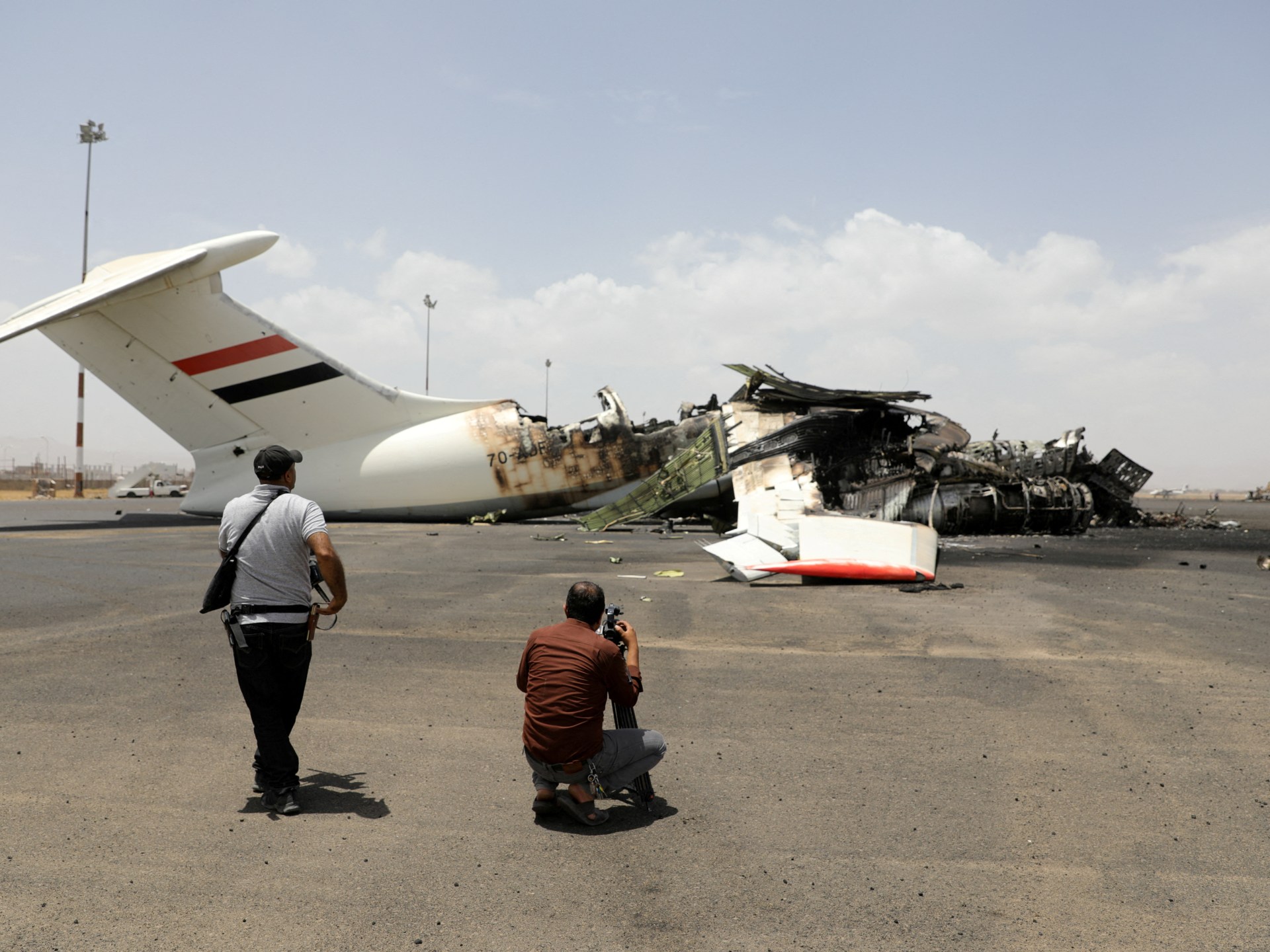Middle East
Palestine and the decline of the US empire | Israel-Palestine conflict

It has been 19 months now since the start of the Israeli war on Gaza. The International Court of Justice is investigating a “plausible genocide”, while the International Criminal Court has issued arrest warrants for Israeli Prime Minister Benjamin Netanyahu and his former Defence Minister Yoav Gallant for war crimes. Scholars of genocide, major human rights organisations, and United Nations experts have identified what is going on in Gaza as genocide. People across the world have marched to call on their governments to act to stop it.
There is a single power that stands in the way of putting an end to this genocide: the United States. One administration has handed over to another, and yet there has been no change in policy. Unconditional support for Israel seems to be a doctrine that the US political establishment is unwilling to touch.
Various analyses have suggested that at the root of this “special relationship” are Judeo-Christian values and a shared democratic path; others have argued that it has to do with the two-party system and the donor class dominating US politics.
But the reality is far simpler. The US views Israel as a critical ally because it helps promote US global supremacy at a time when it is facing inevitable decline. Israel’s survival in its current settler-colonial form – the US elites believe – is closely tied to maintaining US supremacy.
The supremacy of US empire
Since the collapse of the Soviet Union and the end of the Cold War, the US has been leading a unipolar world as the sole superpower.
As a continuation of Western imperial global dominance, the US empire holds much sway over global economic, political, and cultural matters, often with devastating consequences for the lives of millions of people around the world.
Like all empires, the US solidifies and expands its position of supremacy and hegemony in the world through its overwhelming military force. Through the US infrastructure of organised imperial violence, it is able to secure access to and control of resources, trade routes, and markets. This, in turn, guarantees continuous economic growth and dominance.
But in recent years, we have seen signs that US supremacy is being challenged. The momentum to do so built up in the aftermath of the 2008-2009 US financial crisis, which turned into a global one. It demonstrated the negative impact of US supremacy on the world economy and motivated powers such as China and India to take action to protect themselves from it. The BRICS coalition of economies emerged as their shared response on the economic front.
In the following years, various US foreign policy mishaps, including the US failure in Afghanistan, its waning influence in Africa and its inability to prevent the Russian invasion of Ukraine, also demonstrated the limits of US global power.
The rise of US President Donald Trump and far-right populism in the United States reflected the fact that cracks were appearing in the very core of the US-led so-called liberal order.
No empire has ever easily accepted its decline, and neither will the US. It intends to hold onto its status as the unquestionable superpower, and for that, it needs imperial outposts to stand loyally by its side.
Israel – the most reliable imperial ally
Throughout the Cold War, Western Europe and Israel stood as the US’s junior partners in its confrontation with the Soviet Union in Europe and the Middle East. Today, while the decades-old transatlantic alliance seems to somewhat falter, the US-Israeli relationship appears as strong as ever.
Israel has demonstrated loyalty as an imperial outpost. It has played a key role in supporting US imperialism in two ways.
First, Israel helps the US secure its access to and control over one of the most critical markets for any empire: the energy market. The Middle East is an important force in the global energy trade, and its oil and gas policies can have a tremendous impact on the world economy.
What the US fears the most is losing its dominance in the global energy markets to a competing power, which is why it wants to secure its interests by establishing a regional order in the Middle East that overwhelmingly favours its imperial power. This new order is about giving the US a major advantage over any competitor seeking to make inroads into the region, namely China.
For the administration of former US President Joe Biden and its successor, the Trump administration, the Israeli genocide of Palestinians and aggression against neighbouring countries are about establishing this new security reality in the region by eliminating hostile groups and governments. That is why US support for them has not stopped.
Second, Israel plays a critical role in advancing US military supremacy. The US provides Israel with billions of dollars in aid, which is in fact a form of self-investment in developing military capabilities and expanding sales. The Israeli state uses these funds to buy weapons from US arms manufacturers, which then use Israel’s deployment of that weaponry in the Middle East as testing and marketing tools. The US military-industrial complex is thus able to sell more weapons and continue to innovate and grow to ensure the US has a military edge over its rivals.
In this sense, Israel is one of the most critical parts of the US imperial machinery. Without it, the US would find it challenging to maintain its imperial power in the Middle East. It is for this reason that Biden once famously proclaimed that if Israel did not exist, the US would have to invent it.
Free Palestine and global decolonisation
Over the past year, we have witnessed an unprecedented attack on the Palestine solidarity movement in the US, which has affected all public spheres, including education and healthcare. We have also seen an intensification of US threats against states, such as South Africa, for their support for Palestine.
Based on the magnitude of the resources and energy that the US empire expends on the elimination and subjugation of Palestinians, one has to wonder, what is it about a stateless people with no economic and diplomatic capital or military power that terrifies the world’s sole superpower?
The answer is that the US empire views a free Palestine as the beginning of its own end.
The US is actively working to prevent the world from doing the right thing and isolating the Israeli state economically and politically because it fears what may come next. Such isolation would make it difficult for Israel to continue its existence as a settler colonial project, and ultimately could lead to a decolonisation process. The end result of that would be Palestinians and Israelis living together under a new decolonial political system that would be integrated into the region and would no longer serve imperial power.
A decolonised entity in Palestine/Israel would be a major step in the decolonisation of the world order itself and its liberation from US imperial power. And this is what the US dreads.
In this sense, it is in the self-interest of the overwhelming majority of the world’s nations to follow this path. The future of Palestinians, who are facing the real threat of elimination and total subjugation today, depends on this. And the future of many other nations, if they wish to avoid the current unspeakable brutalities that Palestinians are facing all on their own, also depends on this.
As much as the US needs a settler colonial Israel to stave off its decline, the world, particularly the Global South, needs a decolonised Palestine to hasten US decline. Palestine, not just metaphorically but literally, stands in the way of US and Western imperialism’s onward march towards continued global supremacy.
The views expressed in this article are the author’s own and do not necessarily reflect Al Jazeera’s editorial stance.
Middle East
Libyan authorities reject report they will take in US deportees | Donald Trump News

The Trump administration has sought agreements allowing it to send immigrants to third countries for detention.
IAuthorities in Libya, a country still divided after years of civil war, have denied reports that they will receive undocumented migrants deported by the United States.
The Reuters news agency reported on Wednesday that deportation flights from the US to the North African country could begin this week, despite previous government reports raising alarm over unsafe conditions there.
The National Unity government, which controls western Libya, said in a statement that it rejected the use of its territory as a destination for deporting migrants without its knowledge or consent.
“The Government of National Unity categorically denies any agreement or coordination with US authorities regarding the deportation of migrants to Libya,” it said in a statement.
Haftar’s Libyan National Army, which controls eastern Libya, also rejected the report, saying that migrants “will not be received through airports and ports secured by the Armed Forces, and that this is completely false and we cannot accept it at all.”
The report by Reuters, which cites three anonymous US officials, says that the US military could fly migrants to Libya for detention as soon as Wednesday, but notes that those plans are subject to change. The number and nationality of the migrants who could be deported are unknown.
The administration of US President Donald Trump has sought out third countries where it can deport and detain undocumented immigrants, part of a larger push to enact the administration’s hard-right vision of immigration enforcement.
And on April 30, Secretary of State Marco Rubio announced at a cabinet meeting at the White House that the US was requesting that countries take its undocumented migrants.
“We are working with other countries to say: We want to send you some of the most despicable human beings, will you do this as a favour to us?” Rubio said. “And the further away from America, the better.”
‘Extortion, forced labour and unlawful killings’
Authorities in Libya have long been willing and controversial partners in immigration enforcement, collaborating with the European Union to intercept and detain migrants and refugees attempting to cross the Mediterranean to reach Europe.
A 2022 statement from the human rights watchdog Amnesty International says that “men, women and children returned to Libya face arbitrary detention, torture, cruel and inhuman detention conditions, rape and sexual violence, extortion, forced labour and unlawful killings”.
The US government itself has also documented unsafe conditions in Libya, with a report released last year by the Department of State noting “harsh and life-threatening prison conditions” and “arbitrary arrest and detention”.
Such conditions have not deterred the Trump administration from sending undocumented immigrants to prisons known for abusive conditions in countries like El Salvador, sometimes based on unsubstantiated allegations of gang affiliation and without due process.
The practice of third countries entering into agreements with Western nations to warehouse undocumented migrants and asylum seekers is also not entirely new.
Earlier this week, Rwanda also stated that it was discussing the possibility of receiving undocumented immigrants from the US. The Rwandan government has also previously entered into an agreement with the United Kingdom to hold asylum seekers while their claims were processed in the UK, although that deal ultimately stalled out when faced with backlash and legal challenges.
Middle East
UK arms exports to Israel press ahead despite licence suspension: Study | Israel-Palestine conflict News

British pro-Palestinian activist groups found that since September the government had sent ‘8,630 separate munitions’ to Israel.
A new report has found that United Kingdom firms have continued to export military items to Israel despite a government suspension in September last year, amid allegations that the British parliament has been deliberately “misled”.
A report by the Palestinian Youth Movement, Progressive International and Workers for a Free Palestine revealed on Wednesday that the UK sent “8,630 separate munitions since the suspensions took effect, all in the category ‘Bombs, Grenades, Torpedoes, Mines, Missiles And Similar Munitions Of War And Parts Thereof-Other’.
“Despite [Foreign Minister] David Lammy, Trade Secretary Jonathan Reynolds MP and other Ministers repeatedly reiterating in the House of Commons that the Government has ended this direct supply of F-35 [fighter jets] parts, the evidence indicates that they have continued to send direct shipments of components for lethal F-35 jets to Israel after September 2024 – and that these shipments are ongoing,” it added.
In September, Lammy announced the suspension of 29 arms export licences, out of 350, that were used during Israel’s war on Gaza.
Lammy said the government had found there had been a “clear risk” that the licences “might be used to commit or facilitate a serious violation of international humanitarian law”. He said the ongoing licences covered items such as “goggles and helmets for use by one of the UK’s closest allies”.
‘Parliament misled’
The report used data from the Israel Tax Authority and concluded that Lammy had “misled” Parliament and the public about arms exports to Israel.
Former Labour shadow Chancellor John McDonnell said the government has a lot of “explaining to do” in response to the report.
“If Parliament has been misled by the Foreign Secretary or any minister it is a resigning matter and more importantly it attracts potentially a charge of complicity in war crimes. The Government has shrouded its arms supplies to Israel in secrecy,” McDonnell said.
Former leader of the Labour Party and independent MP, Jeremy Corbyn, said the report could explain why the government has not responded to a call for a public inquiry into the UK’s role in Israel’s military assault.
“When will the UK government come clean about the reality of military cooperation with Israel? The public deserves to know the full scale of the UK’s complicity in crimes against humanity – and we are not going anywhere until we have established the truth,” he said.
The Foreign Office told Al Jazeera that the government has suspended the “relevant licences” that might be used to “commit or facilitate serious violations of International Humanitarian Law in Gaza.”
“Of the remaining licences for Israel, the vast majority are not for the Israeli Defence Forces but are for civilian purposes or re-export, and therefore are not used in the war in Gaza. The only exemption is the F-35 programme due to its strategic role in NATO and wider implications for international peace and security,” the ministry said.
“Any suggestion that the UK is licensing other weapons for use by Israel in the war in Gaza is misleading.”
“The UK totally opposes an expansion of Israel’s military operations in Gaza. We urge all parties to return urgently to talks, implement the ceasefire agreement in full, secure the release of hostages taken by Hamas, and work towards a permanent peace,” it added.
Middle East
Yemen’s Houthis say attacks on Israel not in US ceasefire deal in ‘any way’ | Houthis News

The US and Yemen’s Houthis agreed to an Oman-mediated deal to cease trading attacks after weeks of air strikes.
A ceasefire deal between Yemen’s Houthis and the United States does not include any operations against Israel, the group’s chief negotiator has announced.
Mohammed Abdulsalam told the Reuters news agency on Wednesday that attacking Israel was not included in “any way, shape or form” in the agreement mediated by Oman.
The announcement of the deal came hours after Israeli warplanes targeted Yemen’s Sanaa airport. Airport director Khaled al-Shaief told Al Masirah on Wednesday that “around $500 million in losses were caused by the Israeli aggression” on the airport.
The deal was announced a day earlier by US President Donald Trump, who said attacks on Yemen against the Houthis would stop, effective immediately, after the group agreed to stop targeting vessels in the Red Sea.
In a statement on Tuesday, Omani Foreign Minister Badr Albusaidi said that “following recent discussions and contacts … with the aim of de-escalation, efforts have resulted in a ceasefire agreement between the two sides”.
“Neither side will target the other … ensuring freedom of navigation and the smooth flow of international commercial shipping” in the Red Sea, he added.
Attacks on shipping
Since Israel began its war on Gaza in October 2023 following the Hamas attack on southern Israel, the Houthis have targeted Israel and vessels in the Red Sea in solidarity with Palestinians under fire.
During the fleeting ceasefire in Gaza earlier this year, the Houthis paused their attacks but restarted following Israel’s decision to enforce a total blockade on the enclave in early March, followed soon after by its full resumption of the war.
The group also threatened to restart attacks on shipping, which had been paused since January, which triggered a response from the US military in the form of near-daily air strikes.
But announcing the agreement on Tuesday, Trump said the Houthis “don’t want to fight any more”.
“And we will honour that, and we will stop the bombings, and they have capitulated,” he added.
“They say they will not be blowing up ships any more, and that’s… the purpose of what we were doing.”
But Abdulsalam told Houthi-affiliated news outlet Al Masirah TV that any US action would result in a response following the deal.
“If the American enemy resumes its attacks, we will resume our strikes,” he said.
“The real guarantee for the accord is the dark experience that the United States has had in Yemen,” he added.
Houthi political leader Mahdi al-Mashat also said attacks on Israel “will continue” and go “beyond what the Israeli enemy can withstand”.
A ballistic missile attack fired by the Houthis on Ben Gurion International Airport on Sunday hit the perimeter of the airport, injuring eight people, damaging a road and a vehicle and forcing air traffic to stop.
The Israeli military confirmed its defence system failed to shoot down the projectile, despite several attempts to intercept it, adding that an investigation was under way.
-

 Middle East2 days ago
Middle East2 days agoIsrael bombs Yemen’s Hodeidah port after attack near Tel Aviv | Politics News
-

 Africa2 days ago
Africa2 days agoIsraeli cabinet approves plans to capture all of the Gaza Strip
-

 Sports1 day ago
Sports1 day agoLindsey Vonn says she proved to herself and her doubters that ‘I deserve to be here’ after skiing return
-

 Conflict Zones1 day ago
Conflict Zones1 day ago‘We are suffering’: Displaced families bear burden of South Sudan conflict | Humanitarian Crises News
-

 Europe2 days ago
Europe2 days agoUkrainian drones attack Moscow, halting flights ahead of major military parade
-

 Lifestyle2 days ago
Lifestyle2 days agoDiplomats in Zimbabwe embrace local culture in a lively cooking contest
-

 Middle East1 day ago
Middle East1 day agoNo sense in Gaza ceasefire talks amid Israel’s ‘hunger war’: Hamas | Israel-Palestine conflict News
-

 Lifestyle1 day ago
Lifestyle1 day agoOne Tech Tip: Skype shut down for good, but users still have these alternatives




